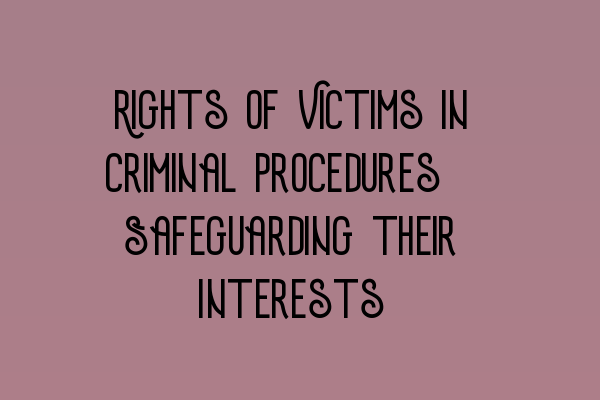Rights of Victims in Criminal Procedures: Safeguarding their Interests
When it comes to criminal procedures, it is crucial to prioritize the rights and interests of victims. Throughout the entire process, victims should be provided with the necessary support, protection, and respect to ensure their rights are safeguarded. In this blog post, we will explore the various rights of victims in criminal procedures and the importance of upholding those rights.
Rights during Investigation
During the investigation stage, victims have the right to be informed about the progress of the case. They should be regularly updated on any developments, such as arrests or charges. This helps victims feel included and empowers them to make informed decisions.
Additionally, victims have the right to be present during interviews with the accused. This allows them to provide their perspective and ensures their voice is heard. By being present, victims can also ensure that their interests are adequately represented and protected.
For victims who need support during the investigation process, organizations such as SQE 1 Preparation Courses provide assistance and guidance to help victims understand their rights and navigate the complex legal procedures.
Rights during Court Proceedings
Throughout the court proceedings, victims have several rights that contribute to fair and just outcomes. Firstly, victims have the right to be informed about court dates, times, and any changes to the schedule. This ensures victims can plan accordingly and be prepared for their involvement in the proceedings.
Victims also have the right to be treated with dignity and respect while in the courtroom. Judges, lawyers, and all other individuals involved in the case must uphold this right, creating an environment that acknowledges the trauma and hardships experienced by victims.
Furthermore, victims have the right to give a victim impact statement, expressing the physical, emotional, and financial harm caused by the crime. This statement is presented during the sentencing phase and allows victims to share their experiences and advocate for an appropriate punishment for the accused.
One way victims can ensure their rights are protected is by staying informed about SRA SQE Exam Dates. This information helps victims plan their involvement in court proceedings effectively, reducing any unnecessary stress or confusion.
Rights after the Trial
Even after the trial is concluded, victims still have rights that need to be upheld. Victims have the right to be informed about the outcome of the trial, including the conviction or acquittal of the accused. This information is essential for victims to find closure and move forward with their lives.
In cases where the accused is convicted, victims have the right to be present during the sentencing phase. This allows them to witness the accountability and potential justice being served for the crimes committed against them. Additionally, victims have the right to provide input on the appropriate punishment or restitution, ensuring their interests are considered.
Organizations like SQE 2 Preparation Courses offer post-trial support to victims, helping them navigate any legal processes related to compensation or rehabilitation.
It is important to understand that victim rights are not just legal principles but essential components of a fair and just justice system. By safeguarding the rights of victims in criminal procedures, we can promote a society that prioritizes empathy, support, and justice for all.
For more information on criminal law and procedure, you can refer to our other related articles:
- SQE 1 Practice Exam Questions
- SQE 1 Practice Mocks FLK1 FLK2
- SQE 2 Preparation Courses
- SQE 1 Preparation Courses
- SRA SQE Exam Dates
